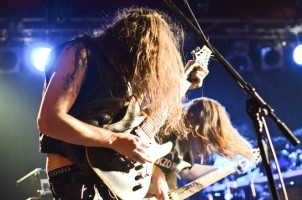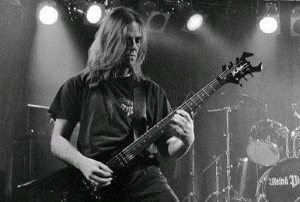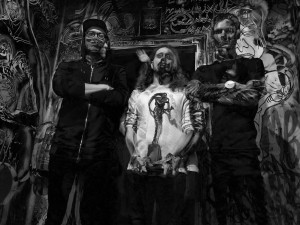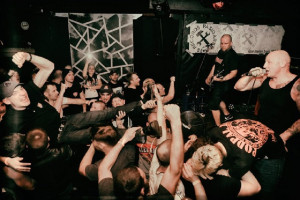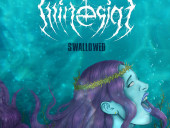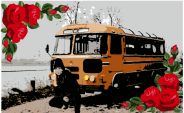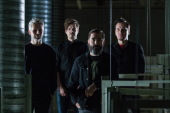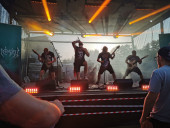Black metal is a genre that has been changing and mutating since it’s inception years ago in Norway/England/Brazil, whatever your view is (yes, some people see Sacrofago as the first). I’ve mentioned my affinity with black metal earlier in another edition of Eindhoven Calling! This is reason for me to be even more excited about this band Eschatos that I’ve come across. On twitter, they suddenly popped up and I started listening to their music.
One thing immediately stood out and that’s their tight sounding recordings. The bandname has some biblical meanings as ‘The uttermost, the last, the end’, which sounds rather apt in this genre. The sound is tight and dark, but also very clean and condensed. They are not afraid to step away from the raw, unblemished sound of noisy Norwegian black metal bands that purists would ascribe to the genre as ‘how it’s supposed to be’. Some guitar solo’s and even something Dire Straits –esque on the track ‘Crusaders Of Sodom’, which title actually sums up my opinion about the ‘Straits, but also post-metal atmospheric parts and postrock soundscapes are part of the Eschatos sound.
Contrary to what you might think, the nothingness that Eschatos speaks about in their bio is not that of 2012, why would a band then record stuff in 2013. I suppose it’s part of the bleak worldview that is part of black metal philosophy (read that anyway you like, show me a cheery, happy view that is expressed in black metal and we have something). Interesting is how the very anti-establishment black metal band describes their work as art that expresses untamed, lawless and destructive, where bands like Darkthrone and Mayhem revelled in the primal sound they produced. Interesting is a female vocalist, in a genre where the main part of the population is male. Kristiāna, Jānis and Edvards, formerly active in Ocularis Infernum, started the band at the end of 2012 and completed their line-up with Edgars from the band Grondh. They’ve released an ep in that short time, which is very good. They consider themselves unbound and liberated to do what they want to create. What they want to create is black art that brings about feelings of condemnation, discomfort and madness. It needs to fan the flame of hate and chaos.
Let’s get into it with the band themselves. We’ve got Edvards Percevs, Kristiana Karklina, en Jānis Bušs answering some questions concerning Eschatos. Edgars Gultnieks, the fourth band member, was not available (though fourth in no way describes the importance of a member in what can best be called a collective).
GS: So how did Eschatos get started, where you in other bands apart from Grondh and Ocularis Infernum?
Jānis (J): The formation of Eschatos was the natural outcome of things. We all knew each other, knew what we wanted to achieve and what to expect from each other. It just came together. Edvards plays in another band, that plays prog/death metal named Opifex. I played in another black metal band called Velna Krusti, back in the day. The name Eschatos symbolizes many things for us. It’s the end of something and life after death. It’s also the highest point, it came to us pretty naturally. We did play with some other names, but this name was right and washed away any doubts.
GS: I’m pretty curious what you guys do in daily life.
J: I earn my daily hunk of bread working as a graphic designer. It’s really the thing I like doing best among a great deal of useless crap that’s out there.
Kristiāna (K): There are a very few things I do not do. I am studding theory of art, designing, taking pictures, painting, making movies, organizing exhibitions…. you name it.
Edvards (E): Most of my time is occupied by my studies in Social Anthropology, but I somehow find myself being immersed in many other things, ranging from playing music to graphic design, video or audio editing, building something and learning new things that I come across.
Edgars studies Theory of Culture.
GS: What I find particularly interesting is that you call black metal art, where much of the original black metal musicians aimed for something opposing art, beauty and such. Can you elaborate on this?
J: Art is not necessarily associated with beauty, though beauty is different for every other person. Art is a product of creativity and imagination that triggers an experience. We use the term to describe the passionate and majestic work that is our creation of something. For me black metal always was a deep, intense form of art, which I imagine not all people can understand. Destruction can be labeled as creation, because it’s something you do and create, right?
K: Considering that art and what it is, is still something that is being discussed among art critics and academics, especially due to the strong conceptual nature of art in the 20th century, I will not discuss it’s nature. There is one thing I can say for sure: in our case, music as art presents itself as a combined spiritual experience, resulting in the birth of an entity of autonomous existence that is music. (ed. being a Liberal Arts student myself, I still may have failed to properly express the vision of Kristiana here, if so I apologize)
J: Art is always personal; it’s the expression and reflection of the artist. It gives a glimpse of the artist’s soul, if I may say so.
K: I would add that true art always involves a personal perspective, whether it’s a painting, sculpture, symphony or a black metal composition. Art is the only way to travel to whatever layers of consciousness you can endure.
GS: What are your main inspirations as a band, musically and otherwise?
J: It’s hard to emphasize specific things, since there is so much that inspires me. Mostly it’s not music that lights up something in me, which I want to express in our creations. These are experiences from meditations, visions and vivid emotional explosions I’ve experienced. Musically I listen to so much things, from black metal to experimental, progressive, classical, ambient and even indie music. What I seek is music with a strong atmosphere and an artistic, even ideological background, because without this, music is empty. I really admire the Swedish and French black metal scenes nowadays. The have these profound, dedicated scenes with so many good bands, but as I said before, many things inspire me and this is only the top of the iceberg.
GS: How’s having a female vocalist working out, in a scene that pretty much has been devoid of women from it’s earliest days on (referring to the original Norwegian scene)
K: I believe this question was not meant for me, but I will answer it anyway. Firstly, I don’t think women in black metal are such a rarity. There are bands like Darkestrah, Astarte, and Darkened Nocturn Slaughtercult. Although none of these I consider my own favorites. Secondly, I cannot start to explain he insignificance of gender when it comes to musical abilities or talent.
GS: Can you tell me more about the Latvian black metal scene, what’s it like and does it have any typical qualities? The only bands I’ve managed to track down where Skyforger, who I’ve gotten to know pretty well, and Dark Domination. What else is out there?
J: There is no such thing as a scene here, you can count the active bands with the fingers of one hand, if you skip the bedroom projects. There have been many bands, they come and go but none really leave a legacy. Skyforger is a great band, but a lot of the black metal has disappeared from their music. Dark Domination is probably the only surviving band of Latvian black metal, as they are the only band that has lasted so long. Urskumug is a notable act as well and I hope Ocularis Infernum and Grondh have left their marks too. The rest, to me, is just dust in the wind… If you would look for parallels in the sound, I suppose you can stumble upon some bands, though nothing big enough tot talk about a typical sound.
I think black metal is still ‘entering’ Latvia. Of course, we have a history in the genre, which started somewhere in the mid 90’s, but I don’t feel it has a strong foundation and dedicated scene.
GS: Is the Latvian metal scene a tight community or divided into the different genres?
J: I would say it’s very much divided, with emphasis on some genres like death metal and alternative metal, where the last is a completely different scene. I’m glad that the last years brought more tolerance and appreciation for more experimental and unorthodox music to the scene.
E: I would like to add that the whole scene, though divided, maintains a degree of interaction. Almost every metalhead plays some kind of instrument and is usually involved into different projects at the same time. There’s a saying here in Latvia, that: ‘Where there are two guys, there are three bands’… or something like that. Everyone seems to know everyone and in concerts, the genres are usually just thrown together, mixing up fans of different genres at these concerts.
GS: Black metal has been associate with Satanism, white supremacists and pagan ideals. Grondh also incorporated an amount of Satanist philosophy into it’s work. Do you feel that the clear anti-attitude of black metal in any way confines you? What do you consider the views that Eschatos represents?
K: As unconventional as it may seem, we don’t consider anything like that to be a boundary for our art - Satanism, racism, paganism or any other ‘ism’ for that matter. At this point I believe black metal has grown to be more of a unifying phenomenon than restrictive bridle. It is not our purpose to express absolute ideas. Our art is quite autotelic, but surely – one who is willing to listen, will find one’s own truths as well as ours.
E: In a way, the black metal culture has become conventional by now in it’s ideals, which seems to be in contradiction to that anti-attitude. I don’t think it’s wise to present our attitudes in some given instructions or manuals, like the aforementioned ‘isms’. It’s often the case that these ideals become the main point, and not what they represent or were used for in the first place.
GS: What inspires your lyrics?
K: I have always believed that in art only pain, suffering and loss can awaken the true genius. For me to write, a strong trigger is required and the last year has been just that. Of course, amongst the sources of inspiration there’s literature, philosophy, visual art, music and after all – a human being, concealing such a great variety of different self-destructive passions.
GS: What is a live show of Eschatos like live and what do you try to give people during a show? Do you prefer to record or play live?
K: I can say for sure that both are completely different experiences, though they are both vital. Recording gives you the advantage of perfectionism when this is needed. Live performance appeals to the other senses. For me it’s hard to comment about playing live, because the connection to reality becomes quite loose when playing live.
E: I don’t prefer either, when we play music it’s like a spiritual experience and during live shows we offer the option for others to immerse themselves in it. It’s hard to capture this in a recording, but this is an inspiring and creative activity. It gives many new insights and ideas.
GS: What do you hope to achieve in the next few years as a band?
K: We have already achieved the only thing that truly matters – we create.
Eschatos is an interesting band with a fascinating view on what they do. There’s a taste of developing views tot hem and also a liberty in making their piece of art. They might be one of the most exciting bands I’ve come across in a while. So go see them when they play near you, go have a chat and I bet you’ll soon be in a good debate about art and music.


